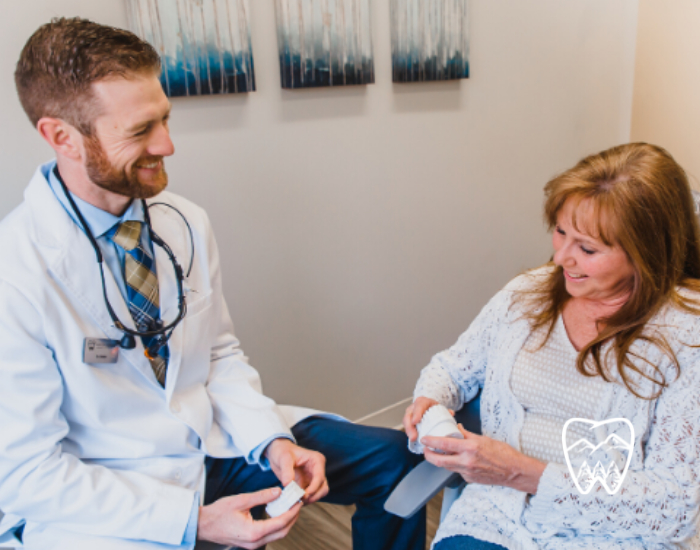Tooth Extraction Post-Op Instructions
Are you worried about compromising the healing process after a tooth extraction? Are you uncertain about what you should or shouldn’t do in the immediate aftermath of a tooth extraction procedure? In this article, you’ll discover some of the tooth extraction site post-operation instructions routinely given by the professionals at Green Dental Care.
Avoid Spicy Foods
It is recommended that you avoid spicy foods during the first few days after your tooth extraction procedure. Spicy foods can trigger pain at the extraction site because some of the active ingredients in the spices could irritate exposed nerves, causing intense pain. Additionally, some of those spices may react with the clot at the extraction site and break it up, resulting in fresh bleeding. It is therefore advisable for you to refrain from consuming any spicy foods in the first week after your tooth extraction surgery.
Avoid Chewy or Sticky Foods
We asked our friend, Dr. Taher Dhoon, a dentist in Greeley, CO, about post tooth extraction recommendations. Dr. Dhoon advises patients to refrain from eating chewy or sticky foods during the first 4-5 days after the tooth has been extracted. Sticky or chewy foods can get stuck in the socket left after the tooth was surgically removed. Additionally, any sticky or chewy foods that you consume can attach to the clot in the extraction site, and these foods will remove the clot.
Brush Carefully
You should not neglect your routine oral hygiene habits like brushing and flossing just because you have just had a tooth extracted. However, it is important to brush carefully, especially the areas close to the extraction site. To be on the safe side, don’t brush or rinse the mouth in the first 24 hours after the tooth extraction procedure. Thereafter, brush with care and don’t allow the toothbrush to get close to the extraction site. Also, don’t swish water, mouthwash or any oral care fluid in your mouth. Just lower your mouth and let the oral care liquids (warm salty water, for example) pour out of your mouth under the force of gravity.
Prevent Dry Socket
Dry socket is a painful condition in which one loses the clot during the initial stages of the healing process and the socket remains open. The healing process will be compromised once this happens. Parker dental care experts recommend three key steps to prevent dry socket.
First, patients are advised to avoid sucking through a straw since this may dislodge the blood clot that has formed at the tooth extraction site.
Secondly, Dr. Green advises against spitting forcefully during the first week or so after the tooth extraction procedure. Such a forceful act can dislodge the blood clot and result in dry socket.
Thirdly, it is advisable to avoid smoking for at least one week after your tooth has been extracted. Smoking can interfere with the efficient flow of blood to the extraction site, so healing may take longer. Additionally, the chemicals in cigarettes can also break up the clot and cause bleeding at the extraction site.
Use an Ice Pack
Green Dental Care also recommends that you apply an ice pack to the exterior of the side of your jaw where a tooth was removed. Keep the ice pack on for a maximum of 20 minutes and then keep it off for a minimum of 10 minutes. Do this during your waking hours in the first 24 hours after the tooth was extracted. The ice pack will help to minimize swelling. After 24 hours, discontinue the use of an ice pack and resort to applying a warm towel to the jaw.
Opt for a Soft Diet
Only eat soft food during the first few days after your tooth is extracted. Foods like mashed potatoes, yogurt, pudding and smoothies are suitable for someone who has just undergone tooth extraction. After about 5 days, switch back to your normal diet unless you experience soreness or pain while chewing. In that case, revert to the soft foods once again.
Avoid Sports or Vigorous Activities
Emergency dentists in Parker, CO also recommend that patients avoid taking part in sports or any vigorous activities during the first 5 days after having a tooth extracted. Such activities can apply pressure on the extraction site, and you may end up losing the clot covering the socket.
Take All Meds as Prescribed
Your dentist may prescribe some medications, such as pain medication and antibiotics, after the tooth extraction procedure. Take all those medications in accordance with the instructions given by Dr. Green. This adherence will keep you free from pain, and infections will be warded off during the healing process.
Notify your doctor or dentist as soon as you suspect that you have developed an allergic reaction to the medication you are taking. For example, you could develop a rash, itchiness, swelling or difficulty breathing.
Follow-Up Visits with Your Dentist in Parker, CO
Another important part of your post tooth extraction care is the follow-up visits scheduled by Dr. Green or any other dental care professional who extracted your tooth. The first visit usually happens about a week after the extraction.
These follow-up visits enable the dentist to check the extraction site and confirm that you are healing as expected. The follow-up visit may also provide an opportunity to remove any sutures that were placed during the extraction procedure.
You should honor all the follow-up appointments recommended so that any developing issue during the healing process can be detected and resolved promptly.
While the post-op process is expected to proceed smoothly, it is also wise for you to know when something may be wrong and you need urgent attention. For example, you should contact the dentist or your doctor immediately if you are in severe pain days after the extraction, or when swelling increases. Don’t disregard anything unusual that you experience during the healing process. Contact Green Dental Care immediately so that you can be given professional advice about the next steps to take.









